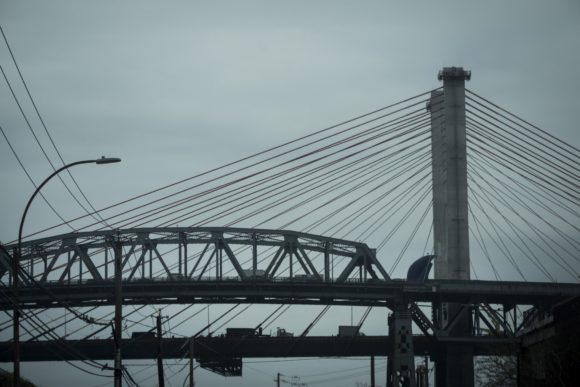French construction giant Vinci SA faces allegations it’s partly to blame for the degradation of the armor installed on New York City’s Kosciuszko Bridge to protect against terrorist attacks and accidents.
Hardwire LLC, a Baltimore company that bid unsuccessfully on the project, previously sued one of its former executives for allegedly stealing its proprietary technology for bridge armor so he could win the contract. On Tuesday, Hardwire sought permission to add two units of Vinci to the suit, which claims damages of more than $40 million.
The armor is “splitting, delaminating, and is in danger of falling off,” causing a “clear and present danger,” according to the proposed revised complaint filed in federal court in Maryland. The separation “leaves significant vulnerabilities for the bridge cable.”
The Kosciuszko Bridge, which connects Brooklyn to Queens, was reconstructed in 2017, though its storied history dates to a crossing for pedestrians in the early 1800s. The Brooklyn-Queens Expressway, a major thoroughfare, runs across the span, making it a possible target of terrorism
Hardwire alleges the scheme to cheat it out of the contract was orchestrated by its former vice president Irvin “Skip” Ebaugh, who the company claims spirited away more than 27,000 confidential files on a thumb drive when he was fired in 2013 after a falling out with colleagues.
Ebaugh went on to found Infrastructure Armor LLC, which Hardwire accuses of stealing its “secret sauce,” or confidential data and trade secrets, covering bridge armor manufacturing, installation and pricing to win the multimillion-dollar Kosciuszko bid. Infrastructure Armor’s inexpert application of the technology is responsible for flaws with the bridge that pose an “imminent danger” to the public, according to the suit.
Hardwire says it had worked with Vinci’s Freyssinet prior to Ebaugh’s termination to jointly pitch bridge construction projects. The Baltimore company claims Freyssinet ended up collaborating with Ebaugh on the Kosciuszko job and violating its own non-disclosure agreement with Hardwire.
“As it turns out, Freyssinet International was intentionally concealing its wrongful actions so as to hide from Hardwire that it had disclosed its proprietary and confidential information,” according the complaint.
Ebaugh has denied the allegations in court papers, calling the suit an attempt by Hardwire to “maintain its perceived monopoly” and defame him. In August, a Maryland judge rejected his request to dismiss some of the claims.
A criminal investigation into the alleged trade-secret theft is ongoing following a 2016 FBI raid of Ebaugh’s home and his company’s headquarters, according to the complaint. Ebaugh acknowledged the probe in a June filing, while saying he is “without sufficient information to admitor deny what the FBI determined in the four years since its investigation.”
Vinci declined to comment. The FBI didn’t immediately respond to an email seeking comment.
Hardwire says on its website has installed protective systems and armor on bridges, buildings and utilities across the U.S. to protect against terrorist attacks. It also makes body and vehicle armor.
The case is Hardwire v. Infrastructure Armor, 20-cv-00304, U.S. District Court, District of Maryland.
–With assistance from Gaspard Sebag.
About the photo: The new Kosciuszko Bridge, foreground, stands in front of the old bridge during the grand opening in the Brooklyn borough of New York, U.S.
Was this article valuable?
Here are more articles you may enjoy.


 Canceled FEMA Review Council Vote Leaves Flood Insurance Reforms in Limbo
Canceled FEMA Review Council Vote Leaves Flood Insurance Reforms in Limbo  One out of 10 Cars Sold in Europe Is Now Made by a Chinese Brand
One out of 10 Cars Sold in Europe Is Now Made by a Chinese Brand  Navigators Can’t Parse ‘Additional Insured’ Policy Wording in Georgia Explosion Case
Navigators Can’t Parse ‘Additional Insured’ Policy Wording in Georgia Explosion Case  Hackers Hit Sensitive Targets in 37 Nations in Spying Plot
Hackers Hit Sensitive Targets in 37 Nations in Spying Plot 